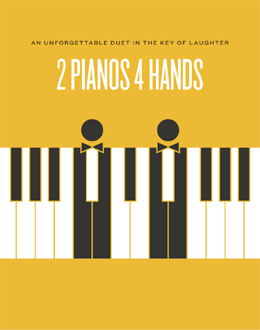2 Pianos 4 Hands: A Great Accomplishment

Written, Starring, and Directed by Ted Dykstra and Richard Greenblatt
The difficulty in writing about a show such as 2 Pianos 4 Hands is that there is very little left to say that hasn’t been said or repeated in the 16 years and 5,000 performances that have elapsed since it appeared, to great acclaim, in its first incarnation at the Tarragon Theatre in Toronto.
Far more accomplished reviewers than I doubtless ran out of superlatives years ago in writing about this show as it progressed from venue to venue and country to country, garnering more than two million in attendance, so I will just get in line and say this: it is a brilliantly crafted, deeply human piece which grabs your attention from the first note, and clings to it long after you have left the theatre.
And as ephemeral as live performance is, that is a sign of great accomplishment.
Based on the lives of the show’s two creators, the story traces the progress of two men in their quivering attempts, first as pre-teens, later in adult-hood, to forge meaning in their lives through the rigours of classical music.
The journey, fraught with tyrannical parents and self-absorbed mentors, takes us right up to the door-step of their middle-age as the hard realities of roads not taken and commitments deferred reveal their mediocrity and stain their adulthood with the patina of dreams unfulfilled.
The irony in this is that the fact of the show itself, its very existence and remarkable success, tells an off-stage story with a very different ending – the diametric opposite to the on-stage version.
What Richard Greenblatt and Ted Dykstra have accomplished with this show in fact personifies every performer’s dream: to tell a compellingly personal story with roots deep in the common human experience, that entertains vast audiences and achieves great acclaim.
Fringe Festivals are positively teeming with aspirants to such glory - slaves to this desire. The “actor’s story’” is a staple of small theatre spaces and “Off, Off” venues from Edmonton to Edinburgh. Alas, as with the characters in the play, so too in real life, many will come slowly to realize that those who “Dream” cannot compete with those who “Do”, and “raw talent” alone will not suffice.
But cheer up! 2 Pianos 4 Hands is not all hard lessons on life’s disappointments – far from it!
Employing the gamut of comedic styles from slapstick and vaudeville, to wry, character-driven repartee, Dykstra and Greenblatt fill the space with the different symbols of authority sent to judge them and the different people they themselves were or have become.
The results are both hilarious and chilling.
Greenblatt’s gimlet-eyed portrayal of the examiner at a conservatory audition, who delivers a stinging rebuke to Dykstra’s lack of gravitas and drive, is the personification of our worst nightmares: being exposed as inadequate. It is a brilliant balance between straight talk and cruel invective – one felt the whole opening-night audience cringe even as it laughed out loud.
At the same time, Dykstra presents a picture of the recalcitrant, ambivalent teen-ager that stops the show. It is a beautifully crafted, rivetingly authentic tour-de-force of finely observed characterisation, and it sent the audience into gales of laughter.
And so it goes on as each performer takes a turn on the piano bench while his doppelganger stands apart and judges, cajoles, carps and bullies the wretchedly lacking performance each has to offer, in different stages of advancement.
Always the protagonists enter each stage with great bravado, apparently proficient, seemingly competent, but leave defeated – judged wanting - far behind the curve of acceptability.
Sadder but wiser at the end, they commiserate with each other and lick their wounds with a muscular, soaring duet of J S Bach’s Concerto in D minor, 1st movement.
“To Hell with the world – we may not be Horowitz at Carnegie Hall, but we’re the best in the neighbourhood!” they are proclaiming. Thus they embrace the Booby Prize of failed ambition, but with an insouciance and gusto that frees us from pitying them and makes fans of us all.
Of course the other stars of the show are the two magnificent concert grand pianos, gleaming and moored like two luxury cruise ships, end-to-end on a bare stage.
These two great instruments are the platform for Dykstra and Greenblatt to demonstrate their playing skills which, notwithstanding the criticisms of various characters, are truly stunning. Together they demonstrate a capacity for musical interpretation and coordination with one another that literally takes one’s breath away: if you weren’t downloading Mozart, Beethoven, Bach and their cronies before you saw this show, you certainly will be tempted after D&G are through.
This display of talent is protean. It is the apotheosis of two extraordinary players at the height of their powers, and it speaks to the precision and discipline they have brought to their work on this that I daresay would make me reluctant to attend a production that they were not appearing in. It is after all their story, their triumph, and that implies an intimacy with the material that would be hard to duplicate.
But more than that, their interplay reflects the tempo of the classics they are performing: their badinage is delivered with the same crispness and precision of any fugue by Bach. Their sweeping interpretations of the masters have the same vital, heart-stopping quality of being strapped to a mountain bike hurtling down a rugged trail; their intimacy with each other and the material forges a glissando of emotions that sweeps us giddily along with them on their journey.
This is the last time this show will be done by its creators – don’t miss it.
Tags:



